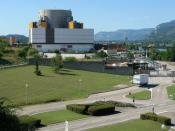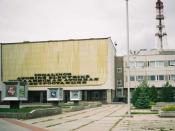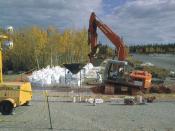"Inherently safe" reactors are a myth. An accident can occur in any nuclear reactor, causing the release of large quantities of deadly fission products into the environment.
Even during normal operation, radioactive materials are regularly discharged into the air and water.
One of the biggest problems facing the nuclear industry is what to do with the radioactive waste generated in a nuclear reactor.
Large quantities of low and intermediate level wastes in liquid or solid form require a disposal route, and the highly radioactive spent fuel rods have to be isolated from the biosphere for hundreds of thousands, sometimes millions of years.
The nuclear industry has had almost 50 years to find a solution to the nuclear waste problem and has failed to do so.
When a nuclear reactor is shut down, many of its component parts have become radioactive. They have to be treated as nuclear waste.
The process of dealing with the power station at this point is called "decommissioning". Over 400 reactors and many other nuclear installations worldwide have to be decommissioned over the next few decades, and there is not much technical expertise in this field.
Vast sums of money will have to be spent on nuclear waste disposal, decommissioning, nuclear transports and the clean-up after radioactive accidents.
There is little sense in continuing to increase the nuclear bill, it would be much wiser to invest in the development and deployment of clean and renewable resources like solar or wind power, wave power, biomass or geothermal energy.
The history of the Nuclear Age is a history of accidents. Many people in different parts of the world suffer from health problems caused by accidents, which happened years or decades ago.
The policy of secrecy, which had surrounded the development of the bomb, was transferred...



OK
Needs sources.
Concise. BUT Plagiarism is obviously present. Aren't you gonna credit people???? hmmm??
Yes, nice essay.
1 out of 1 people found this comment useful.